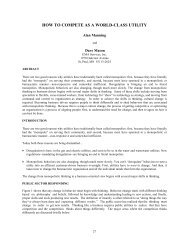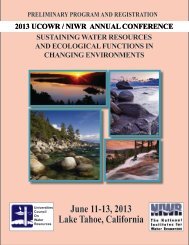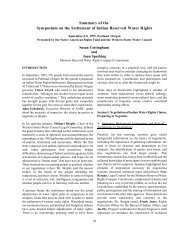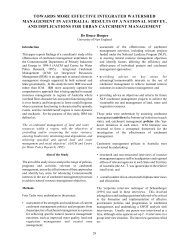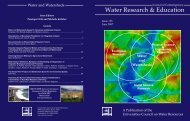Full Journal of Contemporary Water Research and Education, Issue ...
Full Journal of Contemporary Water Research and Education, Issue ...
Full Journal of Contemporary Water Research and Education, Issue ...
Create successful ePaper yourself
Turn your PDF publications into a flip-book with our unique Google optimized e-Paper software.
IWRM in New Zeal<strong>and</strong>: Legislative Framework <strong>and</strong> Implementation91the 1974 Act. The new Local Government Act,similar to the 1974 Act, provides rules under whichdemocratically elected governments can operate. Itis simpler <strong>and</strong> empowers local government, whilealso providing more accountability <strong>and</strong> publicinput. Overall, the Local Government Act requiresmore rigorous <strong>and</strong> transparent decision-making bylocal governments (Department <strong>of</strong> Internal Affairs2005).The Act (a) states the purpose <strong>of</strong> localgovernment, (b) provides a framework <strong>and</strong> powersfor local governments to decide which activitiesthey undertake <strong>and</strong> the manner in which theyundertake them, (c) promotes accountability <strong>of</strong>local governments to their communities, <strong>and</strong> (d)provides for local governments to play a broad rolein promoting the social, economic, environmental,<strong>and</strong> cultural well-being <strong>of</strong> communities, takinga sustainable development approach. The statedpurpose <strong>of</strong> local government is: (a) to enabledemocratic local decision-making <strong>and</strong> action by,<strong>and</strong> on behalf <strong>of</strong>, communities <strong>and</strong> (b) to promotethe social, economic, environmental, <strong>and</strong> culturalwell-being <strong>of</strong> communities in the present <strong>and</strong> forthe future (Government <strong>of</strong> New Zeal<strong>and</strong> 2004).The Act requires local governments to facilitatea process with their communities at least everysix years to identify community outcomes for theintermediate <strong>and</strong> long-term future <strong>of</strong> the districtor region, with the premise that the communitytakes ownership <strong>of</strong> the identified outcomes. TenyearLong Term Council Community Plans arerequired <strong>and</strong> must be reviewed every three years.The Long Term Council Community Plans describethe community outcomes <strong>and</strong> priorities <strong>and</strong> theactivities that the local government will undertaketo contribute to the outcome. “Significant activities”must be put forward in accordance with the LongTerm Council Community Plans. The localauthorities are charged with defining “significantactivity” <strong>and</strong> how priorities are determined,both subject to public review <strong>and</strong> concordance(Government <strong>of</strong> New Zeal<strong>and</strong> 2004).The Treaty <strong>of</strong> Waitangi <strong>and</strong> Natural ResourceManagementThe 1841 Treaty <strong>of</strong> Waitangi, an agreementbetween the English Crown <strong>and</strong> the Maori, hasconstitutional significance that underlies thefoundation <strong>of</strong> society in New Zeal<strong>and</strong>. The treaty<strong>and</strong> implementation are not without controversy<strong>and</strong> differing interpretations (Orange 1987,Brookfield 1999).The principles <strong>of</strong> the treaty are influential in thearea <strong>of</strong> environmental protection <strong>and</strong> natural resourcemanagement. Under the 1987 ConservationAct, 1991 Resource Management Act, <strong>and</strong> 2002Local Government Act, the principles <strong>of</strong> the treatymust be observed <strong>and</strong> the relationship <strong>of</strong> the Maori<strong>and</strong> their culture <strong>and</strong> traditions are considered tobe a matter <strong>of</strong> national importance <strong>and</strong> must berecognized <strong>and</strong> provided for (Government <strong>of</strong> NewZeal<strong>and</strong> 1987, 2004, 2005). Further, the LocalGovernment Act is based on a quadruple bottomline (culture, social, economic, <strong>and</strong> environment)that distinguishes cultural aspects as separate fromsocial aspects for added emphasis. The Maori believefor example, that the forest, waters, <strong>and</strong> alllife supported by them, together with natural phenomenonlike wind, mist, <strong>and</strong> rocks, possess maurior life force (Barlow 1991, Llewell 2004). Theprimary management principal for the Maori isprotection <strong>of</strong> mauri <strong>of</strong> a resource from desecration.The Maori worldview does not separate spiritual<strong>and</strong> intangible aspects from non-spiritual aspects<strong>of</strong> resource management (Tipa 2006).Historically, a rift between treaty obligations<strong>and</strong> modern legal obligations existed. Prior topromulgation <strong>of</strong> these three Acts, New Zeal<strong>and</strong>legislation did not refer to specific obligationsregarding aspects <strong>of</strong> the treaty. A further breachoccurred between treaty obligations <strong>and</strong> regional<strong>and</strong> local council governance, the level <strong>of</strong>government that undertakes actions that most<strong>of</strong>ten affect the Maori (Tunks 2002). The 1974Local Government Act lacked treaty guarantees.This breach was rectified with inclusion <strong>of</strong> treatyprovisions in the 1991 Resource Management Act<strong>and</strong> the 2002 Local Government Act. The ongoingchallenge remains how to incorporate culturalaspects, including spiritual, into decision-makingwhile also addressing the colonial <strong>and</strong> post-colonialhistorical legacy.Some maintain that Maori viewpoints <strong>and</strong>values are not incorporated sufficiently intodecision-making (Mutu 2002, Tunks 2002, Tipa2006). This situation is a result <strong>of</strong> various factorsincluding (a) lack <strong>of</strong> underst<strong>and</strong>ing <strong>of</strong> Maori issuesJOURNAL OF CONTEMPORARY WATER RESEARCH & EDUCATIONUCOWR



